不定式to在什么情况下可以省略
探讨省略to的动词不定式的语法规则

探讨省略to的动词不定式的语法规则
动词不定式是英语中的一种常见语法结构,而to是将动词不定式和动作的执行者隔开的符号。
但是,在某些情况下可以省略to,那么何时可以省略,何时不可以省略呢?
可以省略to的情况
1.当动词不定式作为宾语时,to可以省略。
例如:I want (to) watch a movie tonight.(我今晚想看电影。
)
2.介词后面所跟的动词不定式中的to可以省略。
例如:He refused to talk to me. / He refused talking to me.(他拒绝和我谈话。
)
3.特定动词后面的动词不定式中的to可以省略。
例如:let me know / let me to know(让我知道)
不可以省略to的情况
1.当动词不定式作为主语或表语时,to不可省略。
例如:To be or not to be, that is the question.(生存还是毁灭,这是一个问题。
)
2.在被动语态中,to不可省略。
例如:The building is going to be demolished.(这座建筑将要被拆除。
)
3.在复合宾语结构中,to不可省略。
例如:I want you to help me.(我想让你帮我。
)
综上所述,省略to的动词不定式在特定情况下是可以的,但是也需要视情况而定,不能一味地省略。
掌握好省略to的动词不定式的语法规则,可以有效提高英语的表达水平。
非谓语之哪些情况下不定式要省略to
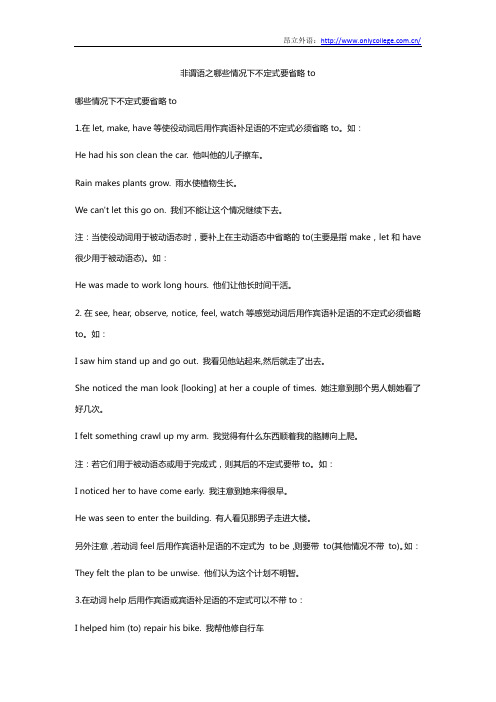
非谓语之哪些情况下不定式要省略to哪些情况下不定式要省略to1.在let, make, have等使役动词后用作宾语补足语的不定式必须省略to。
如:He had his son clean the car. 他叫他的儿子擦车。
Rain makes plants grow. 雨水使植物生长。
We can't let this go on. 我们不能让这个情况继续下去。
注:当使役动词用于被动语态时,要补上在主动语态中省略的to(主要是指make,let和have 很少用于被动语态)。
如:He was made to work long hours. 他们让他长时间干活。
2. 在see, hear, observe, notice, feel, watch等感觉动词后用作宾语补足语的不定式必须省略to。
如:I saw him stand up and go out. 我看见他站起来,然后就走了出去。
She noticed the man look [looking] at her a couple of times. 她注意到那个男人朝她看了好几次。
I felt something crawl up my arm. 我觉得有什么东西顺着我的胳膊向上爬。
注:若它们用于被动语态或用于完成式,则其后的不定式要带to。
如:I noticed her to have come early. 我注意到她来得很早。
He was seen to enter the building. 有人看见那男子走进大楼。
另外注意,若动词feel后用作宾语补足语的不定式为to be,则要带to(其他情况不带to)。
如:They felt the plan to be unwise. 他们认为这个计划不明智。
3.在动词help后用作宾语或宾语补足语的不定式可以不带to:I helped him (to) repair his bike. 我帮他修自行车注:当help用于被动语态时,不定式前的to不能省略。
九种不定式省略to的情况
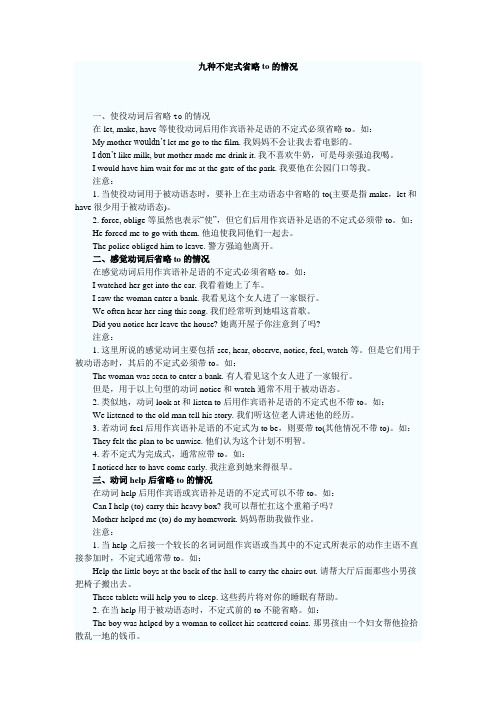
九种不定式省略to的情况一、使役动词后省略to的情况在let, make, have等使役动词后用作宾语补足语的不定式必须省略to。
如:My mother wouldn’t let me go to the film. 我妈妈不会让我去看电影的。
I don’t like milk, but mother made me drink it. 我不喜欢牛奶,可是母亲强迫我喝。
I would have him wait for me at the gate of the park. 我要他在公园门口等我。
注意:1. 当使役动词用于被动语态时,要补上在主动语态中省略的to(主要是指make,let和have很少用于被动语态)。
2. force, oblige等虽然也表示“使”,但它们后用作宾语补足语的不定式必须带to。
如:He forced me to go with them. 他迫使我同他们一起去。
The police obliged him to leave. 警方强迫他离开。
二、感觉动词后省略to的情况在感觉动词后用作宾语补足语的不定式必须省略to。
如:I watched her get into the car. 我看着她上了车。
I saw the woman enter a bank. 我看见这个女人进了一家银行。
We often hear her sing this song. 我们经常听到她唱这首歌。
Did you notice her leave the house? 她离开屋子你注意到了吗?注意:1. 这里所说的感觉动词主要包括see, hear, observe, notice, feel, watch等。
但是它们用于被动语态时,其后的不定式必须带to。
如:The woman was seen to enter a bank. 有人看见这个女人进了一家银行。
但是,用于以上句型的动词notice 和watch通常不用于被动语态。
不定式省略to的10种情况
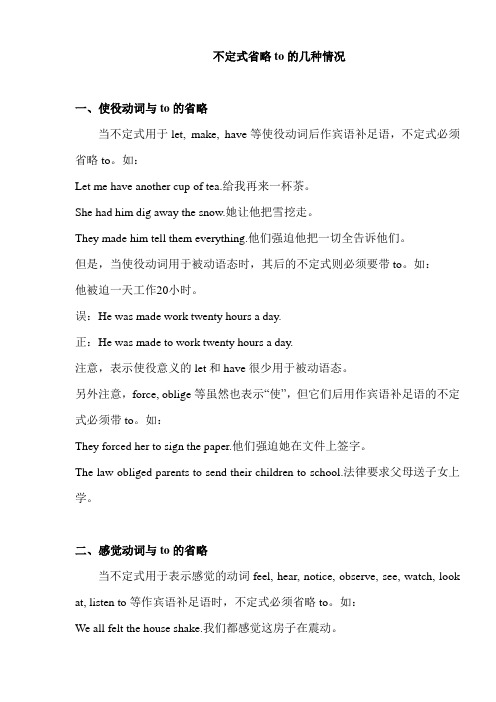
不定式省略to的几种情况一、使役动词与to的省略当不定式用于let, make, have等使役动词后作宾语补足语,不定式必须省略to。
如:Let me have another cup of tea.给我再来一杯茶。
She had him dig away the snow.她让他把雪挖走。
They made him tell them everything.他们强迫他把一切全告诉他们。
但是,当使役动词用于被动语态时,其后的不定式则必须要带to。
如:他被迫一天工作20小时。
误:He was made work twenty hours a day.正:He was made to work twenty hours a day.注意,表示使役意义的let和have很少用于被动语态。
另外注意,force, oblige等虽然也表示“使”,但它们后用作宾语补足语的不定式必须带to。
如:They forced her to sign the paper.他们强迫她在文件上签字。
The law obliged parents to send their children to school.法律要求父母送子女上学。
二、感觉动词与to的省略当不定式用于表示感觉的动词feel, hear, notice, observe, see, watch, look at, listen to等作宾语补足语时,不定式必须省略to。
如:We all felt the house shake.我们都感觉这房子在震动。
I heard him go down the stairs.我听见他下楼了。
Did you notice her leave the house?她离开屋子你注意到了吗?I watched her get into the car.我看着她上了车。
但是,当feel后用作宾语补足语的不定式为to be时,则不能省略to。
省略to的不定式了解省略to的不定式的用法

省略to的不定式了解省略to的不定式的用法不定式是英语中的一种非谓语动词形式,它通常由动词原形加上to 构成,例如:to go(去), to eat(吃),to sleep(睡觉)等。
然而,在某些情况下,我们可以忽略不定式前的to,这种形式被称为省略to的不定式。
本文将介绍省略to的不定式的用法以及相关注意事项。
一、省略to的不定式主要用于下列几种情况:1. 动词let当动词let后面接不定式时,to可以省略。
例如:- She let me go to the party.(她让我去参加派对。
)2. 感官动词感官动词如see、watch、hear等后面接宾语和不定式时,to可以省略。
例如:- I heard him sing in the concert.(我听到他在音乐会上唱歌。
)3. 情态动词情态动词如can、may、must等后面接不定式时,to可以省略。
例如:- You must do your homework before playing games.(你必须先做作业再玩游戏。
)4. 动词help当动词help后面接不定式时,to可以省略。
例如:- He helped me carry the heavy boxes.(他帮我搬运沉重的箱子。
)二、需要注意的细节问题:1. 第一个动词是make、let、help、see、hear、watch或feel时,后面的动词不定式可以省略to;2. 在句子中,第一个动词是感官动词或情态动词时,后面的动词不定式可以省略to;3. 省略to的不定式只适用于动词不定式的主动形式,不能用于被动形式;4. 不定式的完整形式“to + 动词原形”通常更正式,所以在正式场合或文学作品中,建议使用完整形式。
三、案例分析:1. They helped me (to) clean the house before the guests arrived.(他们帮我在客人到来之前打扫了房间。
不定式省略to的九种情况

不定式省略to的九种情况不定式省略to的九种情况一、使役动词后省略to的情况在let, make, have等使役动词后用作宾语补足语的不定式必须省略to等使役动词后用作宾语补足语的不定式必须省略to。
如:My mother wouldn’t let me go to the film. 我妈妈不会让我去看电影的。
I don’t like milk, but mother made me drink it. 我不喜欢牛奶,可是母亲强迫我喝。
I would have him wait for me at the gate of the park. 我要他在公园门口等我。
注意:1. 当使役动词用于被动语态时,要补上在主动语态中省略的to(主要是指make,let和have很少用于被动语态)。
2. force, oblige等虽然也表示“使”,但它们后用作宾语补足语的不定式必须带to。
如:He forced me to go with them. 他迫使我同他们一起去。
The police obliged him to leave. 警方强迫他离开。
二、感觉动词后省略to的情况在感觉动词后用作宾语补足语的不定式必须省略to在感觉E: 10.5pt; mso-ascii-font-family: 'Times New Rom an'; mso-bidi-font-family: 'Times New Rom an'">。
如:I watched her get into the car. 我看着她上了车。
I saw the woman enter a bank. 我看见这个女人进了一家银行。
We often hear her sing this song. 我们经常听到她唱这首歌。
Did you notice her leave the house? 她离开屋子你注意到了吗?注意:1. 这里所说的感觉动词主要包括see, hear, observe, notice, feel, watch等。
动词不定式省略to的9种情况

不定式省略to的九种情况一、使役动词后省略to的情况在let,make,have等使役动词后用作宾语补足语的不定式必须省略to。
如:Mymotherwouldn’tletmegotothefilm.我妈妈不会让我去看电影的。
Idon’tlikemilk,butmothermademedrinkit.我不喜欢牛奶,可是母亲强迫我喝。
Iwouldhavehimwaitformeatthegateofthepark.我要他在公园门口等我。
注意:1.当使役动词用于被动语态时,要补上在主动语态中省略的to(主要是指make,let和have很少用于被动语态)。
2.force,oblige等虽然也表示2.force,oblige“使”,但它们后用作宾语补足语的不定式必须带to。
如:Heforcedmetogowiththem.他迫使我同他们一起去。
Thepolice obligedhimtoleave.警方强迫他离开。
二、感觉动词后省略to的情况在感觉动词后用作宾语补足语的不定式必须省略to。
如:Iwatchedhergetinto thecar.我看着她上了车。
Isawthewomanenterabank.我看见这个女人进了一家银行。
Weoftenhearhersingthissong.我们经常听到她唱这首歌。
Didyounoticeherleavethehouse?她离开屋子你注意到了吗?注意:1.这里所说的感觉动词主要包括see,hear,observe,notice,feel,watch等。
但是它们用于被动语态时,其后的不定式必须带to。
如:Thewomanwasseen toenterabank.有人看见这个女人进了一家银行。
但是,用于以上句型的动词notice和watch和通常不用于被动语态。
2.类似地,动词lookat和listento 后用作宾语补足语的不定式也不带to。
如:Welistenedtotheoldmantellhissto r y .我们听这位老人讲述3.若动词feel 后用作宾语补足语的不定 式为t o b e ,t o (其他情to)。
高考英语省略to的动词不定式八种情况

高考英语省略to的动词不定式八种情况一、感觉动词后省略to的情况主语+ (四看see/watch/notice/look at,三使役let/make/have,两听listen to/hear, 一感觉feel)+宾语+do sth,省略to。
1. 在感觉动词后用作宾语补足语的不定式必须省略to。
1)这里所说的感觉动词主要包括see, hear, observe, notice, feel, watch等。
但是它们用于被动语态时,其后的不定式必须带to。
如:The woman was seen to enter a bank. 有人看见这个女人进了一家银行。
但是,用于以上句型的动词notice 和watch和通常不用于被动语态。
2)类似地,动词look at和listen to后用作宾语补足语的不定式也不带to。
如:We listened to the old man tell his story. 我们听这位老人讲述他的经历。
3)若动词feel后用作宾语补足语的不定式为to be,则要带to(其他情况不带to)。
如:They felt the plan to be unwise. 他们认为这个计划不明智。
4)若不定式为完成式,通常应带to。
如:I noticed her to have come early. 我注意到她来得很早。
2. 使役动词后省略to的情况在let, make, have等使役动词后用作宾语补足语的不定式必须省略to。
如:My mother wouldn’t let me go to the film. 我妈妈不会让我去看电影的。
1) 当使役动词用于被动语态时,要补上在主动语态中省略的to(主要是指make,let和have很少用于被动语态)。
2) force, oblige等虽然也表示“使”,但它们后用作宾语补足语的不定式必须带to。
如:He forced me to go with them. 他迫使我同他们一起去。
英语中不定式省略to的10种情况
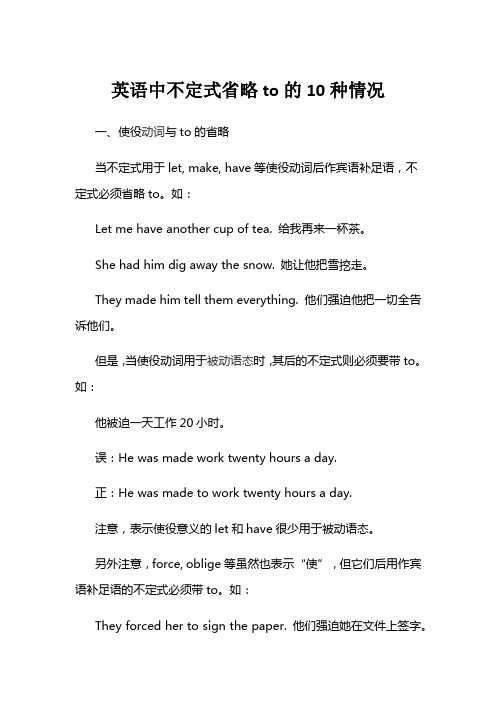
英语中不定式省略to的10种情况一、使役动词与to的省略当不定式用于let, make, have等使役动词后作宾语补足语,不定式必须省略to。
如:Let me have another cup of tea. 给我再来一杯茶。
She had him dig away the snow. 她让他把雪挖走。
They made him tell them everything. 他们强迫他把一切全告诉他们。
但是,当使役动词用于被动语态时,其后的不定式则必须要带to。
如:他被迫一天工作20小时。
误:He was made work twenty hours a day.正:He was made to work twenty hours a day.注意,表示使役意义的let和have很少用于被动语态。
另外注意,force, oblige等虽然也表示“使”,但它们后用作宾语补足语的不定式必须带to。
如:They forced her to sign the paper. 他们强迫她在文件上签字。
The law obliged parents to send their children to school. 法律要求父母送子女上学。
二、感觉动词与to的省略当不定式用于表示感觉的动词feel, hear, notice, observe, see, watch, look at, listen to等作宾语补足语时,不定式必须省略to。
如:We all felt the house shake. 我们都感觉这房子在震动。
I heard him go down the stairs. 我听见他下楼了。
Did you notice her leave the house? 她离开屋子你注意到了吗?I watched her get into the car. 我看着她上了车。
但是,当feel后用作宾语补足语的不定式为to be时,则不能省略to。
高考英语省略to的动词不定式八种情况

高考英语省略to的动词不定式八种情况一、感觉动词后省略to的情况主语+ (四看see/watch/notice/look at,三使役let/make/have,两听listen to/hear, 一感觉feel)+宾语+do sth,省略to。
1. 在感觉动词后用作宾语补足语的不定式必须省略to。
1)这里所说的感觉动词主要包括see, hear, observe, notice, feel, watch等。
但是它们用于被动语态时,其后的不定式必须带to。
如:The woman was seen to enter a bank. 有人看见这个女人进了一家银行。
但是,用于以上句型的动词notice 和watch和通常不用于被动语态。
2)类似地,动词look at和listen to后用作宾语补足语的不定式也不带to。
如:We listened to the old man tell his story. 我们听这位老人讲述他的经历。
3)若动词feel后用作宾语补足语的不定式为to be,则要带to(其他情况不带to)。
如:They felt the plan to be unwise. 他们认为这个计划不明智。
4)若不定式为完成式,通常应带to。
如:I noticed her to have come early. 我注意到她来得很早。
2. 使役动词后省略to的情况在let, make, have等使役动词后用作宾语补足语的不定式必须省略to。
如:My mother wouldn’t let me go to the film. 我妈妈不会让我去看电影的。
1) 当使役动词用于被动语态时,要补上在主动语态中省略的to(主要是指make,let和have很少用于被动语态)。
2) force, oblige等虽然也表示“使”,但它们后用作宾语补足语的不定式必须带to。
如:He forced me to go with them. 他迫使我同他们一起去。
动词不定式符号to的省略
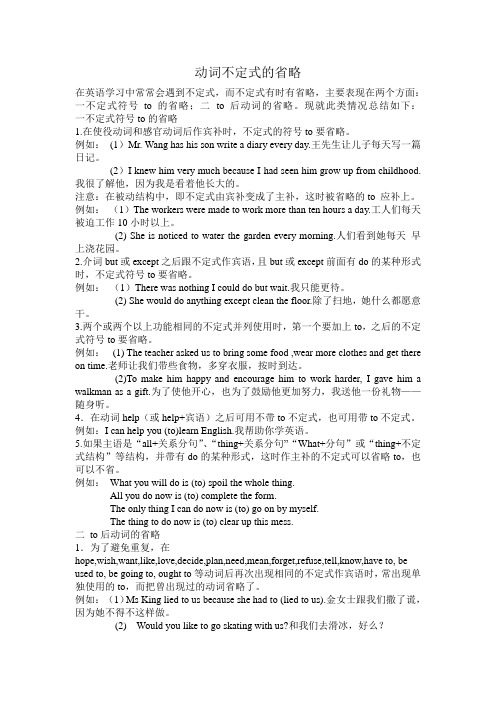
动词不定式的省略在英语学习中常常会遇到不定式,而不定式有时有省略,主要表现在两个方面:一不定式符号to的省略;二to后动词的省略。
现就此类情况总结如下:一不定式符号to的省略1.在使役动词和感官动词后作宾补时,不定式的符号to要省略。
例如:(1)Mr. Wang has his son write a diary every day.王先生让儿子每天写一篇日记。
(2)I knew him very much because I had seen him grow up from childhood.我很了解他,因为我是看着他长大的。
注意:在被动结构中,即不定式由宾补变成了主补,这时被省略的to 应补上。
例如:(1)The workers were made to work more than ten hours a day.工人们每天被迫工作10小时以上。
(2) She is noticed to water the garden every morning.人们看到她每天早上浇花园。
2.介词but或except之后跟不定式作宾语,且but或except前面有do的某种形式时,不定式符号to要省略。
例如:(1)There was nothing I could do but wait.我只能更待。
(2) She would do anything except clean the floor.除了扫地,她什么都愿意干。
3.两个或两个以上功能相同的不定式并列使用时,第一个要加上to,之后的不定式符号to要省略。
例如:(1) The teacher asked us to bring some food ,wear more clothes and get there on time.老师让我们带些食物,多穿衣服,按时到达。
(2)To make him happy and encourage him to work harder, I gave him a walkman as a gift.为了使他开心,也为了鼓励他更加努力,我送他一份礼物——随身听。
省略to的不定式的用法掌握省略to的不定式的正确用法
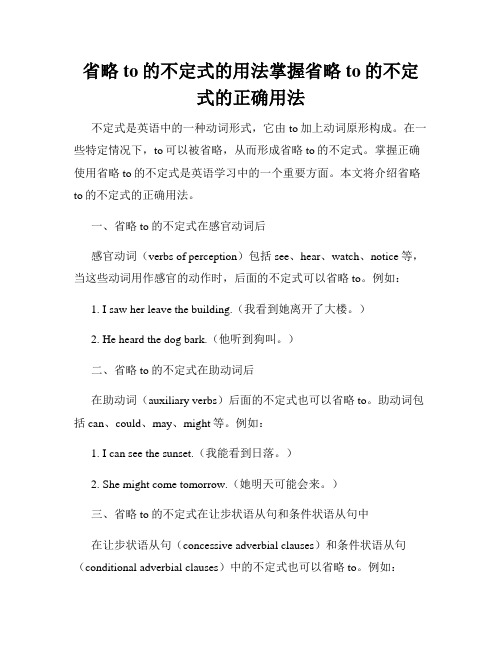
省略to的不定式的用法掌握省略to的不定式的正确用法不定式是英语中的一种动词形式,它由to加上动词原形构成。
在一些特定情况下,to可以被省略,从而形成省略to的不定式。
掌握正确使用省略to的不定式是英语学习中的一个重要方面。
本文将介绍省略to的不定式的正确用法。
一、省略to的不定式在感官动词后感官动词(verbs of perception)包括see、hear、watch、notice等,当这些动词用作感官的动作时,后面的不定式可以省略to。
例如:1. I saw her leave the building.(我看到她离开了大楼。
)2. He heard the dog bark.(他听到狗叫。
)二、省略to的不定式在助动词后在助动词(auxiliary verbs)后面的不定式也可以省略to。
助动词包括can、could、may、might等。
例如:1. I can see the sunset.(我能看到日落。
)2. She might come tomorrow.(她明天可能会来。
)三、省略to的不定式在让步状语从句和条件状语从句中在让步状语从句(concessive adverbial clauses)和条件状语从句(conditional adverbial clauses)中的不定式也可以省略to。
例如:1. Although it's raining, I'll go out.(虽然下雨,但我还是会出去。
)2. If you have any questions, feel free to ask.(如果你有任何问题,随时问我。
)四、省略to的不定式在部分动词后部分动词(verbs of perception、make、let等)后面的不定式也可以省略to。
例如:1. He made me clean the room.(他让我打扫房间。
)2. They let us go early.(他们让我们早点走。
不定式省略to的几种情况及练习题
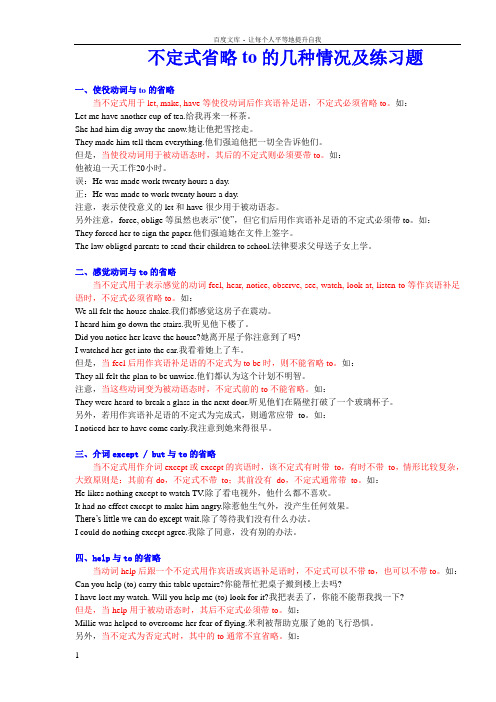
不定式省略to的几种情况及练习题一、使役动词与to的省略当不定式用于let, make, have等使役动词后作宾语补足语,不定式必须省略to。
如:Let me have another cup of tea.给我再来一杯茶。
She had him dig away the snow.她让他把雪挖走。
They made him tell them everything.他们强迫他把一切全告诉他们。
但是,当使役动词用于被动语态时,其后的不定式则必须要带to。
如:他被迫一天工作20小时。
误:He was made work twenty hours a day.正:He was made to work twenty hours a day.注意,表示使役意义的let和have很少用于被动语态。
另外注意,force, oblige等虽然也表示“使”,但它们后用作宾语补足语的不定式必须带to。
如:They forced her to sign the paper.他们强迫她在文件上签字。
The law obliged parents to send their children to school.法律要求父母送子女上学。
二、感觉动词与to的省略当不定式用于表示感觉的动词feel, hear, notice, observe, see, watch, look at, listen to等作宾语补足语时,不定式必须省略to。
如:We all felt the house shake.我们都感觉这房子在震动。
I heard him go down the stairs.我听见他下楼了。
Did you notice her leave the house?她离开屋子你注意到了吗?I watched her get into the car.我看着她上了车。
但是,当feel后用作宾语补足语的不定式为to be时,则不能省略to。
不定式中省去to的十种情况

巩固练习 汉译英 1.我不得不赞赏他的勇气。 I cannot help but admire his courage 2.他宁愿为他的信仰而死。 He would rather die for his belief.
1.他除了整天玩,别无它事可做。
There is nothing he could do but play all day long. 2.为什么不阻止他们污染这条河呢?
我宁愿不告诉他。
十.固定搭配与to的省略
3.prefer+不定式+rather than+动词原形,意为“宁愿做某事
而 不愿做另一事”。 eg. I prefer to walk there rather than go by bus. 我宁愿走着去,而不愿坐公共汽车去。
4. may/might as well+动词原形,意为“不妨做„„”
你怎么不把你的故事扩展成小说呢?
七.主语带do表语省略to的情况
在主语以what、all、the only thing等开头的包含行为动词do
的句子中,作为表语的不定式常可省略to。 eg. 1.All you do now is (to) complete the form. 你现在要做的只是把这张表填好。 2.The only thing to do now is (to) go on.
除惹他生气外,没产生任何效果。
3.There’s little we can do except wait. 除了等待我们没有什么办法。
4.I could do nothing but agree.
我除了同意,没有别的办法。
四.help与to的省略 当动词help后跟一个不定式用作宾语或宾语补足语时,不定式 可以不带to,也可以不带to。 eg. 1.Can you help (to) carry this table upstairs? 你能帮忙把桌子搬到楼上去吗? 2.I have lost my watch. Will you help me (to) look for it? 我把表丢了,你能不能帮我找一下? <注意1> 当help用于被动语态时,其后不定式必须带to。 eg. Millie was helped to overcome her fear of flying. 米利被帮助克服了她的飞行恐惧。 <注意2> 当不定式为否定式时,其中的to通常不宜省略。 eg. How can I help my children not to worry about their exams? 我怎样才能帮助我的孩子们不为他们的考试着急呢?
关于动词不定式中省略to的几种情况
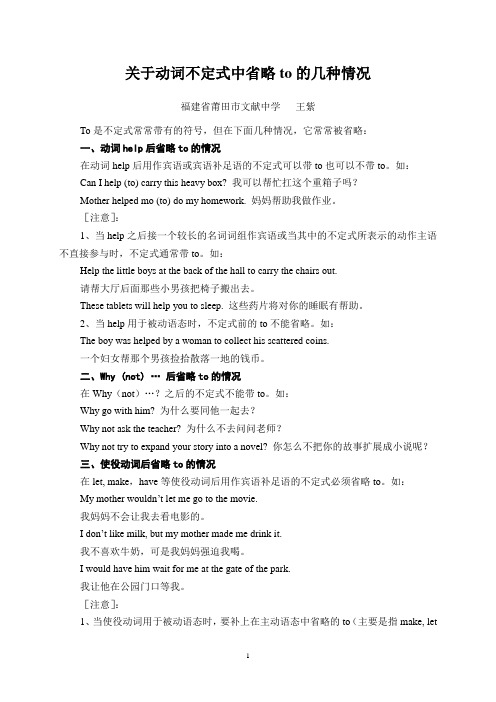
关于动词不定式中省略to的几种情况福建省莆田市文献中学王紫To是不定式常常带有的符号,但在下面几种情况,它常常被省略:一、动词help后省略to的情况在动词help后用作宾语或宾语补足语的不定式可以带to也可以不带to。
如:Can I help (to) carry this heavy box? 我可以帮忙扛这个重箱子吗?Mother helped mo (to) do my homework. 妈妈帮助我做作业。
[注意]:1、当help之后接一个较长的名词词组作宾语或当其中的不定式所表示的动作主语不直接参与时,不定式通常带to。
如:Help the little boys at the back of the hall to carry the chairs out.请帮大厅后面那些小男孩把椅子搬出去。
These tablets will help you to sleep. 这些药片将对你的睡眠有帮助。
2、当help用于被动语态时,不定式前的to不能省略。
如:The boy was helped by a woman to collect his scattered coins.一个妇女帮那个男孩捡拾散落一地的钱币。
二、Why (not) …后省略to的情况在Why(not)…?之后的不定式不能带to。
如:Why go with him? 为什么要同他一起去?Why not ask the teacher? 为什么不去问问老师?Why not try to expand your story into a novel? 你怎么不把你的故事扩展成小说呢?三、使役动词后省略to的情况在let, make,have等使役动词后用作宾语补足语的不定式必须省略to。
如:My mother wouldn’t let me go to the movie.我妈妈不会让我去看电影的。
I don’t like milk, but my mother made me drink it.我不喜欢牛奶,可是我妈妈强迫我喝。
英语中动词不定式省略to的情况
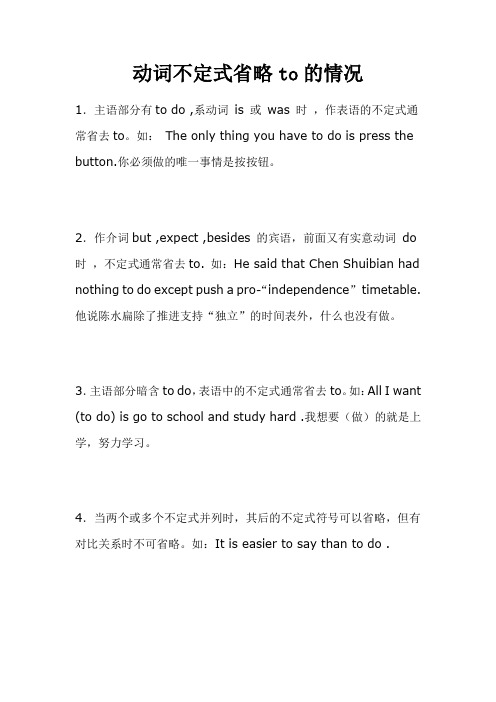
动词不定式省略to的情况1.主语部分有to do ,系动词is 或was 时,作表语的不定式通常省去to。
如:The only thing you have to do is press the button.你必须做的唯一事情是按按钮。
2.作介词but ,expect ,besides 的宾语,前面又有实意动词do 时,不定式通常省去to. 如:He said that Chen Shuibian had nothing to do except push a pro-“independence”timetable.他说陈水扁除了推进支持“独立”的时间表外,什么也没有做。
3.主语部分暗含to do,表语中的不定式通常省去to。
如:All I want (to do) is go to school and study hard .我想要(做)的就是上学,努力学习。
4.当两个或多个不定式并列时,其后的不定式符号可以省略,但有对比关系时不可省略。
如:It is easier to say than to do .5.在would rather…than…等结构中,不定式符号常常要省略. 如:I would rather stay at home than go to see a film.我宁愿呆在家也不愿去看电影。
6.在see ,watch ,notice ,hear, listen to ,look at ,feel ,have, make, let ,observe 等词后作宾语补足语时省略不定式符号to;why (not) do 结构中, 不定式不带to.(1) I saw her enter the room . 我看见她进入了房间(2) Why not join us ?为什么不加入到我们的行列里来呢?。
不定式中省去to的十种情况

不定式中省去to旳十种情况
一.使役动词与to旳省略
当不定式用于let, make, have等使役动词后作宾语补足语,不定 式必须省略to。 eg. 1.Let me have another cup of tea.
给我再来一杯茶。 2.She had him dig away the snow.
七.主语带do表语省略to旳情况
在主语以what、all、the only thing等开头旳包括行为动词do 旳句子中,作为表语旳不定式常可省略to。 eg. 1.All you do now is (to) complete the form.
你目前要做旳只是把这张表填好。 2.The only thing to do now is (to) go on. 迈进是目前唯一旳出路。 3.What I’ll do is (to) tell her the truth. 我要做旳就是告诉她真相。
她想去就能够去。
十.固定搭配与to旳省略
1.had better+动词原形,最佳做某事 eg. You had better stay here.
你最佳呆在这里。 2.“would rather+动词原形”, 意为“宁愿做某事”
eg. 1)We’d rather stay at home.
我们宁愿呆在家里。 2)I would rather not tell him.
二.感觉动词与to旳省略
当不定式用于表达感觉旳动词feel, hear, notice, observe, see, watch, look at, listen to, sense等作宾语补足语时,不定式必须省 略to。 eg. 1.We all felt the house shake.
英语中不定式省略to的九种情况
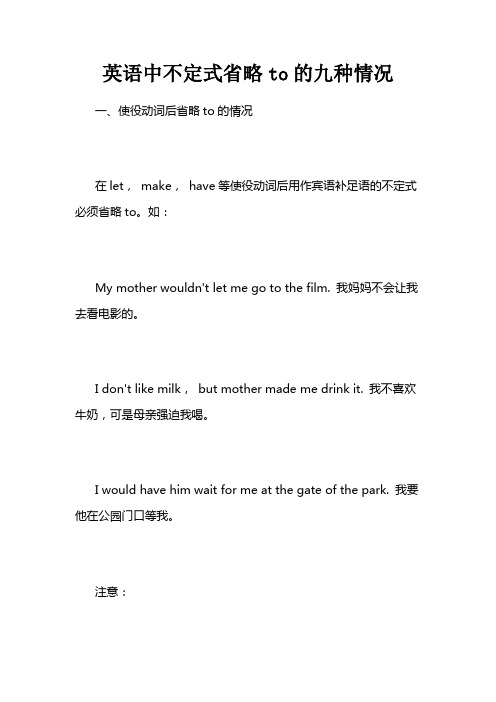
英语中不定式省略to的九种情况一、使役动词后省略to的情况在let,make,have等使役动词后用作宾语补足语的不定式必须省略to。
如:My mother wouldn't let me go to the film. 我妈妈不会让我去看电影的。
I don't like milk,but mother made me drink it. 我不喜欢牛奶,可是母亲强迫我喝。
I would have him wait for me at the gate of the park. 我要他在公园门口等我。
注意:1. 当使役动词用于被动语态时,要补上在主动语态中省略的to(主要是指make,let和have很少用于被动语态)。
2. force,oblige等虽然也表示“使”,但它们后用作宾语补足语的不定式必须带to。
如:He forced me to go with them. 他迫使我同他们一起去。
The police obliged him to leave. 警方强迫他离开。
二、感觉动词后省略to的情况在感觉动词后用作宾语补足语的不定式必须省略to。
如:I watched her get into the car. 我看着她上了车。
I saw the woman enter a bank. 我看见这个女人进了一家银行。
We often hear her sing this song. 我们经常听到她唱这首歌。
Did you notice her leave the house?她离开屋子你注意到了吗?注意:1. 这里所说的感觉动词主要包括see,hear,observe,notice,feel,watch等。
但是它们用于被动语态时,其后的不定式必须带to。
如:The woman was seen to enter a bank. 有人看见这个女人进了一家银行。
但是,用于以上句型的动词notice 和watch通常不用于被动语态。
- 1、下载文档前请自行甄别文档内容的完整性,平台不提供额外的编辑、内容补充、找答案等附加服务。
- 2、"仅部分预览"的文档,不可在线预览部分如存在完整性等问题,可反馈申请退款(可完整预览的文档不适用该条件!)。
- 3、如文档侵犯您的权益,请联系客服反馈,我们会尽快为您处理(人工客服工作时间:9:00-18:30)。
外教一对一
不定式to在什么情况下可以省略
1. 当and或or连接两个并列不定式时,第二个to常省。
I plan to call him and discuss this question.
我计划给他打电话,讨论一下这个问题。
My friend in China asked me to telephone or write to her in my free time.
我中国的朋友让我有空给她打电话或写信。
2. 当两个并列to有对比意义,第二个to不能省。
I haven’t decided to stay at home or to travel to Beijing this holiday.
我还没决定假期是待在家里还是去北京旅行。
To be, or not to be, that is the question.
生存还是毁灭,这是一个值得思考的问题。
(《哈姆雷特》)
3. 当两个to之间无并列连词,to不可省。
I came here not to help you, but to fright you.
我来这不是为了帮你,而是为了吓唬你。
4. 当三个或以上带to不定式构成排比,所有to不可省。
外教一对一
Read not to contradict or confute; nor to believe and take for granted; not to find talk and discourse; but to weigh and consider.。
